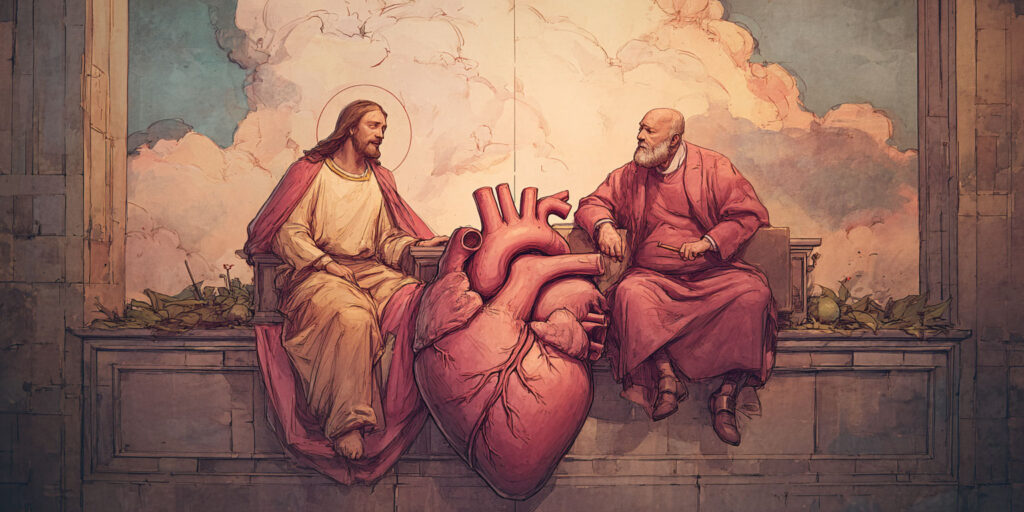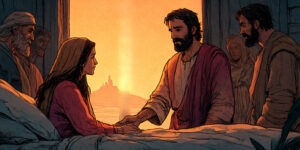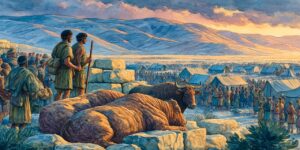
Peace
The gospel claims something bold: God offers real peace. Peace with Him, peace inside yourself, and peace with other people. But that peace isn’t automatic…

Then the Pharisees went and plotted how to entangle him in his words. And they sent their disciples to him, along with the Herodians, saying, “Teacher, we know that you are true and teach the way of God truthfully, and you do not care about anyone’s opinion, for you are not swayed by appearances. Tell us, then, what you think. Is it lawful to pay taxes to Caesar, or not?” But Jesus, aware of their malice, said, “Why put me to the test, you hypocrites? Show me the coin for the tax.” And they brought him a denarius. And Jesus said to them, “Whose likeness and inscription is this?” They said, “Caesar’s.” Then he said to them, “Therefore render to Caesar the things that are Caesar’s, and to God the things that are God’s.” When they heard it, they marveled. And they left him and went away.
The same day Sadducees came to him, who say that there is no resurrection, and they asked him a question, saying, “Teacher, Moses said, ‘If a man dies having no children, his brother must marry the widow and raise up offspring for his brother.’ Now there were seven brothers among us. The first married and died, and having no offspring left his wife to his brother. So too the second and third, down to the seventh. After them all, the woman died. In the resurrection, therefore, of the seven, whose wife will she be? For they all had her.”
But Jesus answered them, “You are wrong, because you know neither the Scriptures nor the power of God.Matthew 22:15-29
There’s a phrase that none of us like to hear: “You’re wrong.” Whether whispered in a quiet correction or shouted in public challenge, it stings. And yet, Jesus—our loving, wise, compassionate Savior—wasn’t afraid to say it when it mattered. In Matthew 22:15–29, Jesus faces a trap set by people who wanted to outsmart Him, embarrass Him, and undermine His growing influence. Instead, they walked away humbled.
But what does this story really teach us today—especially in a world where politics, religion, and personal identity are often tangled together?
The Pharisees and Sadducees came to challenge Jesus, not to learn. With political and religious motives, they hoped to catch Him off guard. But as history (and Scripture) shows, trying to trap Jesus is a losing game. You don’t out-swordfight Zorro, and you don’t challenge Jesus and win.
Yet we often do something similar. When we ignore God’s instructions or justify our own ways of living, we’re silently saying, “I know better.” But faith requires humility. As followers of Christ, we are constantly called to renew our minds, take our thoughts captive, and take on the mind of Christ. That means accepting that sometimes—we’re wrong.
Understanding the religious landscape of Jesus’ time helps us see the full picture:
Pharisees were religiously strict and politically anti-Rome. They believed in life after death and held firmly to the entire Old Testament and oral tradition. Most common Jews sided with them.
Sadducees were more elite, priestly, and politically cooperative with the Romans. They denied the resurrection and accepted only the first five books of the Bible.
Herodians supported King Herod’s rule and alignment with Rome.
Zealots came later. They were revolutionaries who violently resisted Roman rule, eventually provoking the rebellion that led to Jerusalem’s destruction.
These groups didn’t like each other. But they temporarily united against Jesus, because His message exposed their misplaced loyalties and challenged the very foundation of their authority.
Many of us, like Saul (who became Paul), grow up embedded in political or religious identities. Saul was a Pharisee of Pharisees—devoted, zealous, and convinced he was right. But after his dramatic encounter with Jesus, everything changed. His political and religious pride? He called it “rubbish.”
Politics can be a tool God uses to shape us. But when it becomes the centerpiece of our faith—when our hope, identity, or passion is more tied to our party or platform than to Christ—we’re in dangerous territory. Even good things like family, church, or nation can become idols if they try to share the throne of our hearts with God.
God instituted government to bring order. Paul and Peter both wrote about the need to respect governing authorities. Even Jesus said, “Render to Caesar what is Caesar’s, and to God what is God’s.” But the moment government steps into God’s rightful place in our lives, it becomes a problem.
Israel once asked for a king, and though God allowed it, He made it clear: “They are not rejecting you, Samuel—they’re rejecting Me.” They wanted to be like other nations, led by men instead of God. And so began centuries of flawed leadership.
The same temptation faces us today. We want structure. We want strong leaders. But no government—no matter how just or efficient—can replace what only God provides.
Jesus didn’t build a political movement. He didn’t rely on political power. He ministered to everyone—centurions, lepers, tax collectors, and zealots. He healed on the Sabbath, defied unjust laws, and pointed people toward a different kind of kingdom.
He warned of the danger in trusting human rulers. When governments violate God’s law, we must, like the apostles, obey God rather than men. And yet we’re called to engage respectfully, truthfully, and wisely.
The kingdom of God doesn’t need elections, coalitions, or campaigns. It rests on the shoulders of Jesus—our righteous King.
There’s only one throne in our hearts, and only one person worthy of it. Whether it’s politics, family, church, or career—when anything else competes with God for that throne, we’ve lost our way.
Faith in Jesus is the solid rock beneath us. Governments will rise and fall. Political alliances will shift. Promises will be broken. But Christ remains. And when He returns, He won’t run for office—He’ll reign with justice and peace.
If you’ve placed your hope in human systems, step back. Remember who truly governs. Remember the One who died and rose again not to win a vote, but to save your soul.
Let these words be your anchor:
My hope is built on nothing less
Than Jesus’ blood and righteousness.
I dare not trust the sweetest frame,
But wholly lean on Jesus’ name.
On Christ the solid Rock I stand,
All other ground is sinking sand.

The gospel claims something bold: God offers real peace. Peace with Him, peace inside yourself, and peace with other people. But that peace isn’t automatic…

Advent starts by asking us to slow down and look past the distractions. Every culture wraps Christmas in its own extras—traditions, shopping, decorations, sentimental ideas.

After Paul left Galatia, other teachers came. They questioned Paul’s authority and offered the Galatians a far more “comfortable” message…

Jesus leaves the synagogue in Capernaum and steps into a home. Simon Peter’s mother-in-law lies with a high fever.

Paul writes to a church he has never visited, yet he sounds like a pastor who knows them well: he encourages, challenges, and points every road back to Christ…

Biblical hope isn’t wishful thinking or daydreams. It is a confident expectation anchored in what God has already done in Christ and what he has promised to complete…

The story of Jabesh-Gilead opens like a political crisis—but it carries deep spiritual meaning. After Israel had settled in the Promised Land, their incomplete obedience left enemy nations still scattered